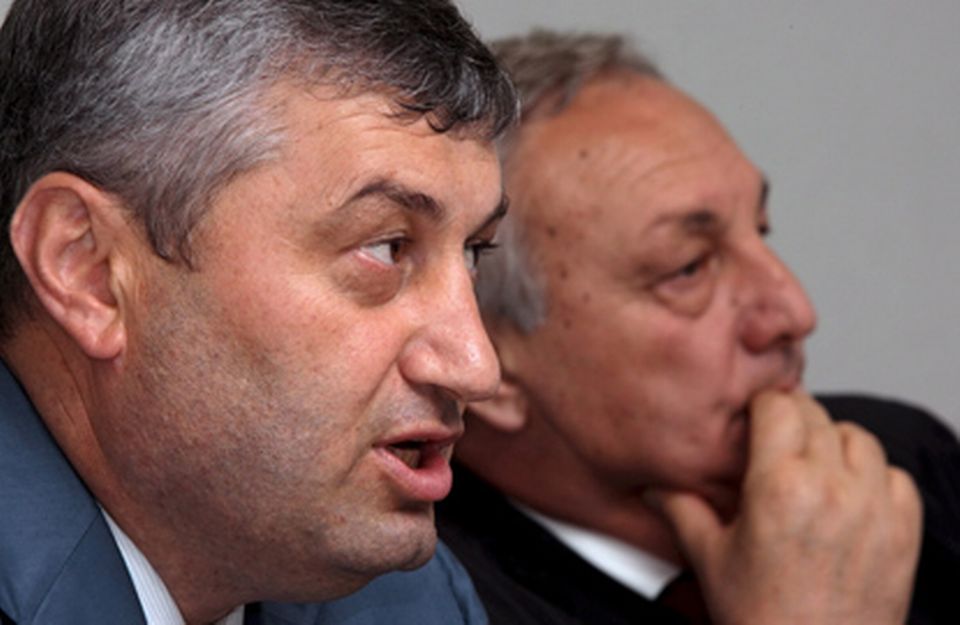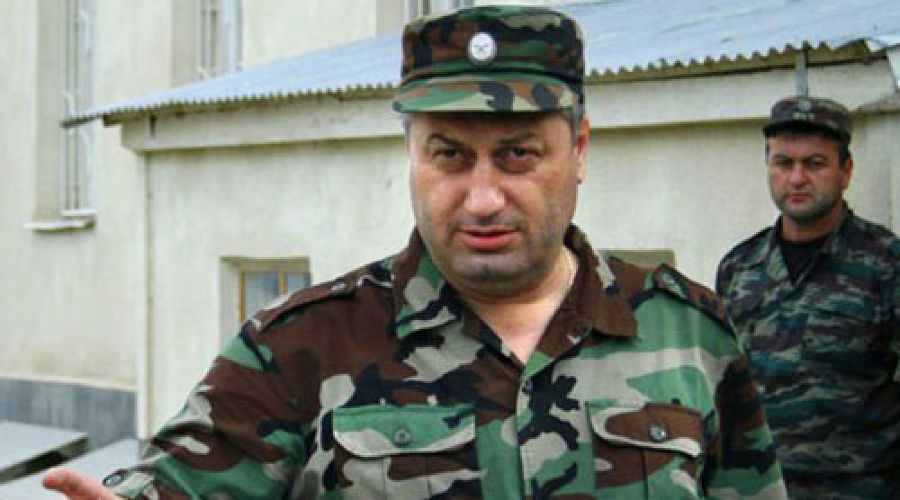The former president of the Republic of South Ossetia, which is a partially recognized state, now leads the Unity party. You can have a different attitude towards Eduard Kokoity, but under him, Russia recognized the country as a former rebellious Georgian region.
early years
Eduard Dzhabeevich Kokoity was born (sometimes the Russian media use the option of a surname — Kokoev) on October 31, 1964 in the city of Tskhinvali, the South Ossetian Autonomous Region, and the Georgian SSR. Father Jabe Gavrilovich for a long time worked in a local boiler room. Mother Demo Pukhaeva was engaged in raising children and housework, raised rabbits and chickens. The neighbors believe that they did not change, even when the son became a great official, they behaved as before. Yes, and Edik always greeted. The family of Eduard Dzhabeevich Kokoity was always respected among his friends and neighbors.
In 1980 he graduated from high school in his hometown. During the Five Day War, it was completely destroyed. Local residents say that they destroyed it precisely because "our president Eduard Kokoity" studied here. In the 80s, he won the championship of Georgia in freestyle wrestling among young men, fulfilling the standard of the master of sports of the USSR.
Start of work
After school, he worked for several years as an electrician in a local post office. Since 1983, he served in the Soviet Armed Forces. He rose to the position of deputy platoon commander in the air defense forces of the Moscow district, Kursk.
After demobilization, he studied at the Faculty of Physical Education of the South Ossetian State Pedagogical Institute, which he graduated in 1988, having received the specialty of a teacher of physical education.
His mentor of those times, Mira Tsavrebova, believes that Kokoev was deservedly elected secretary of the Institute's Komsomol Committee. And although there was an opinion about the students of the sports faculty that they did not differ in their minds, they would not have entrusted such a position to the laps.
First Georgian-South Ossetian conflict
After graduating, the biography of Eduard Kokoity continued at the Komsomol work. By 1991, he was already the head of the Komsomol City Committee and was a republican deputy. At this time, the processes of the collapse of the Soviet Union began, Georgia officially declared independence, and its autonomous region decided to remain part of the Soviet country.
Armed clashes began between the Georgian police, the National Guard and South Ossetian self-defense units. According to the official biography of Eduard Dzhabeevich Kokoity, during this ethnic conflict he created and led the self-defense detachment of South Ossetia. He later joined the group of Gris Kochiev, a weightlifting athlete and a prominent public figure who was considered a key figure in the defense of the rebel region. Although Kokoity was not among the leaders of the armed resistance, he became one of the few officials who directly participated in the hostilities.
In private business
After completing the active phase of the conflict, the hero of our article went to Moscow, where he led the Youth Charity Sports Fund, which provided assistance in the treatment and rehabilitation of South Ossetian participants in the hostilities. According to the opposition, he was mainly engaged in the supply of Ossetian vodka to the Russian market, for which strong Caucasian guys with combat experience were needed.
In September 1996, Eduard Kokoity officially took the post of Deputy General Director of CJSC Frang. The company specialized in real estate trading and trading with South Ossetia. Georgian authorities accused him of organizing arms and drug smuggling.
From Ministers to Presidents
In 1997, Eduard Kokoity officially became the head of trade in the rebel region with his main partner, having been appointed to the post of trade representative in the rank of minister in the Russian Federation. The first president of South Ossetia, Ludwig Chibirov, did not yet know what was growing his rival. At the same time (from 1999 to 2001) was listed as an assistant to Anatoly Chekhoev, State Duma deputy from North Ossetia. In 2000, he resigned from his public post and became a simple general director of CJSC Frang. Since March 2001, he was a member of the leadership of the public movement “For Ossetia”.

In December of the same year, Eduard Kokoity won the presidential election in South Ossetia, beating Chibirov and the representative of the Ossetian communists Kochiev. Some experts believe that the decisive factor was the support of the Tedeev brothers, popular among Ossetians: Dzambolat, the world freestyle wrestling champion and head coach of the Russian national team, and Ibrahim, a businessman and chairman of the human rights commission.
Another aggravation
In the spring of 2004, Georgia, without coordination with the Ossetian administration and Russian peacekeeping forces, introduced detachments of its Ministry of Internal Affairs and army special forces into the South Ossetian region. It was officially announced that the purpose of the raid is to combat smuggling. A sharp escalation of the confrontation between Georgia and South Ossetia took place. There were casualties not only among Ossetian and Georgian military personnel, but also among the civilian Ossetian population. Only on August 20, the Georgian military were withdrawn from the disputed zone.

In June 2006, the heads of the unrecognized republics of South Ossetia, Transnistria and Abkhazia signed an agreement on the possibility of creating joint peacekeeping forces. Eduard Kokoity has always been positioned as a politician striving for closer cooperation with Russia. And he has stated many times that the key political task is the entry of the unrecognized republic into Russia. In March of the same year he announced that he had submitted an application for accession to the Russian Constitutional Court.
Recognition of independence
In November 2006, Eduard Kokoity was unanimously elected for a second term, 96% of voters voted for him. Along with the presidential election, a referendum was held in which 99% of the region's residents voted for the independence of the region, with a turnout of 95.2%.
During the armed conflict that began on 08.08.2008, he was commander in chief of the armed forces. In the morning, with the beginning of the shelling of Tskhinvali, Kokoity, together with the guard, moved to the village of Dzhava, which is not far from the border with Russia, where he was until August 11. This enabled the opposition to subsequently accuse him of cowardice. After the defeat of Georgian troops by the Russian army on August 26, Russia recognized the independence of two republics - Abkhazia and South Ossetia.
In 2011, a presidential election was held in which Eduard Kokoity did not participate. After declaring the election results invalid and vigorous opposition, he resigned in exchange for the cessation of protests. In 2017, he made an attempt to register as a presidential candidate, but could not pass the qualification of settledness - to confirm permanent residence in the territory of a partially recognized state for 10 years.
Personal life
Not much is known about the personal life of a politician. According to press reports, he had two wives, one Georgian, the other Ossetian. But it is known for certain that Kokoity is now married to Madina Tolparova. He has three sons. What the children of Eduard Dzhabeevich Kokoity are doing is not reported in the open press. Ossetian media wrote about the availability of real estate in Moscow, St. Petersburg and Vladikavkaz, and some even talked about a house in Italy.
During the war of 08/08/08, a girl and aunt were often shown, who were interviewed on American television. They began to talk about the attack of the Georgian troops, and the host had to “cough” them. These were the Kokoyevs and, as the Ossetians say: "they are a small nation, there are no namesakes among them, but only relatives." Many of these relatives, according to the Caucasian tradition, held leadership positions under the presidency of Eduard Kokoity.
The politician was awarded orders of other partially recognized republics - Abkhazia and the Transnistrian Moldavian Republic. I was always fond of sports - my favorite free-style wrestling and football. In his free time he is engaged in fishing or hunting.